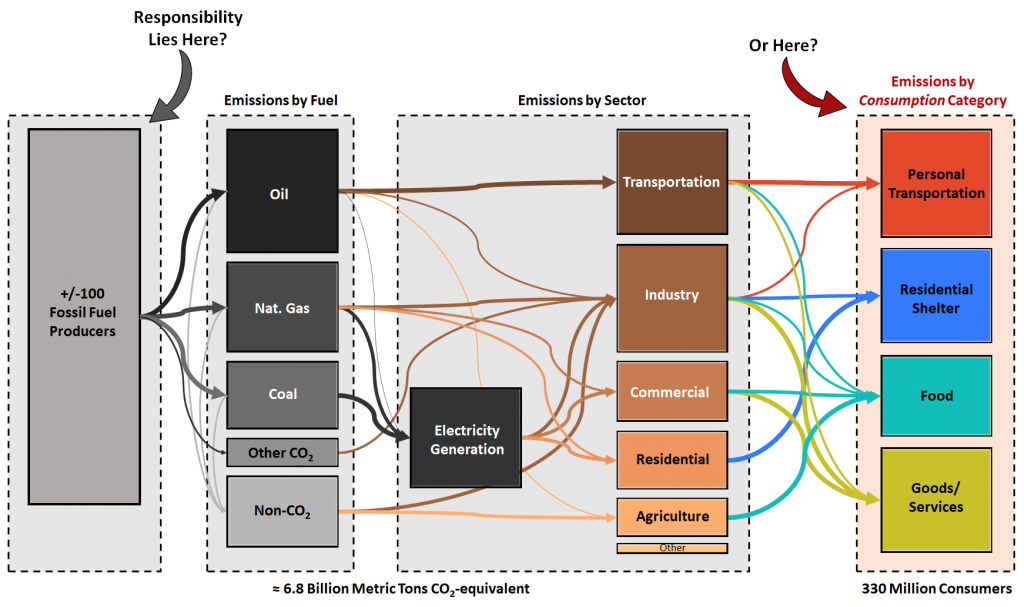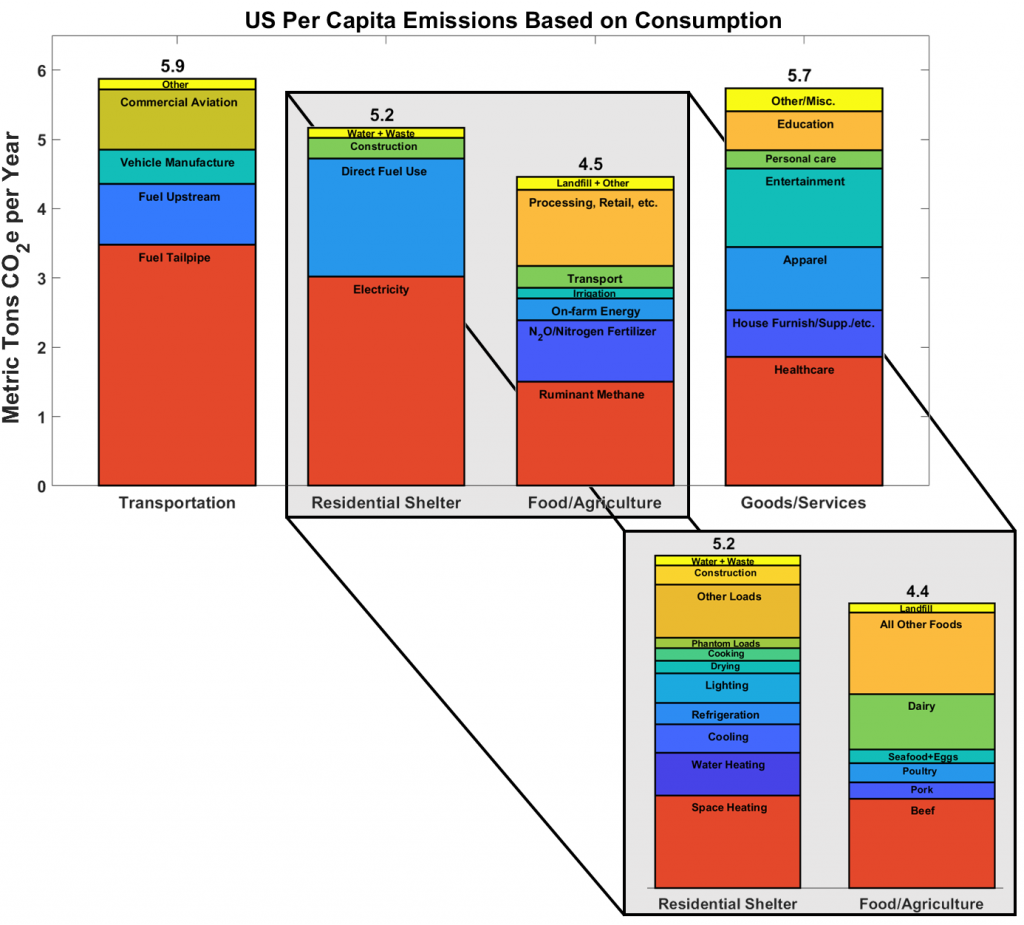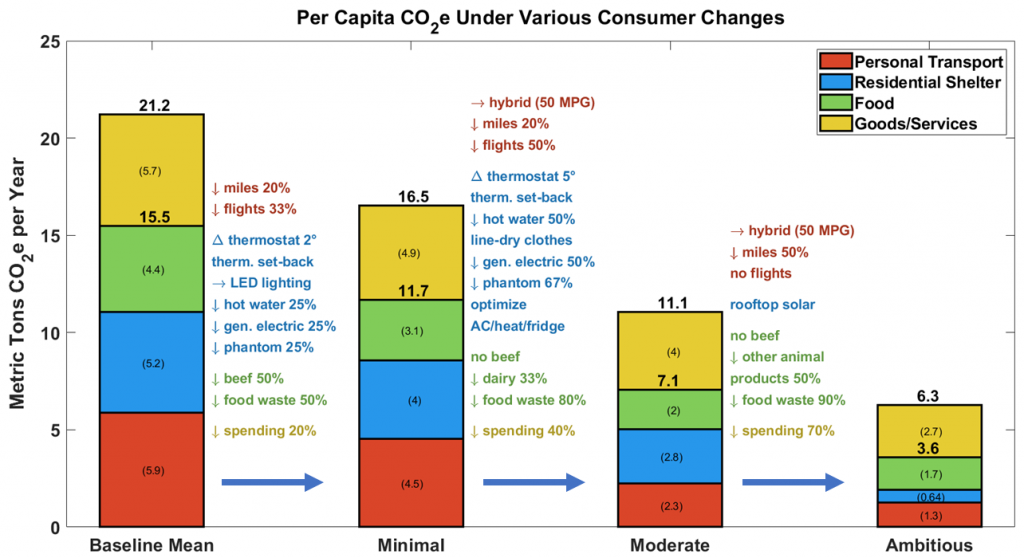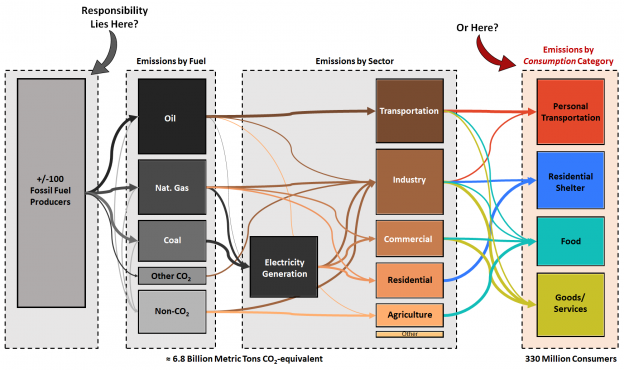Whether 100 or 100,000, it’s consuming the fossil fuels extracted by these companies that ultimately drives climate change
The Takeaways
- The famous 71% figure comes from tracing fossil fuels to the companies that extracted the raw fuel, ignoring all the downstream companies, governments, and individuals that actually use these fuels
- Viewed from the perspective of fossil fuel consumption, global warming emissions are generated by myriad actors, with households the final common driver of the overwhelming majority of climate altering emissions
- Transitioning away from fossil fuels requires a revolution in how economies and households use energy, and it is largely irrelevant that 100 companies extract the majority of fossil fuels
- The 100 companies/71% figure is mainly used to discourage meaningful change, and thus acts as a kind of zombie statistic: Relatively small changes in household consumption across the US populace could dramatically reduce warming emissions
(see also medium.com version)
A Zombie Statistic
A mere 100 hundred companies have generated 71% of warming emissions (based on [1]), so the refrain goes, and so changing your own habits and thinking this a meaningful response to climate change is either delusion, virtue signaling, the result of corporate propaganda, or some combination thereof. This has become the “zombie statistic” of popular climate discourse, cited almost exclusively by those that do genuinely care about the ongoing climate catastrophe, and yet ironically employed toward the utterly counterproductive ends of paralysis and inaction. While not untrue (and indeed an important element of a full understanding of climate change), the zombie nature of this factoid arises from the nihilistic implications that are typically assumed.
For before we shrug in defeat, we might pause to clarify, what are these 100 companies, and just what are they alone doing that is so damaging? Well, they are fossil fuel producers at the primary level of extraction, i.e., coal, oil, and natural gas producers. The number two villain, for example, is the state-owned Saudi oil company Aramco, but it is certainly not pumping oil for its own sake, but for export to consumers around the world. Shall I really burn away hundreds of gallons of gasoline a year in my vehicle, but protest my innocence that the Saudis who dared sell to me are to blame? More broadly, it is the consumption of fossil fuels that is the direct driver of global warming, and, while fossil extraction is clearly a necessary step in the causal chain, to blame this alone ignores the simple fact that fossil producers do not act in a vacuum.
Accounting for emissions by attributing them to primary fuel producers is one choice, but if we actually want to change the world, we are much better served with a consumption-based accounting, one that examines how consumptive acts both directly generate carbon emissions (e.g., driving, residential energy use), and indirectly drive upstream energy use/emissions in other economic sectors (e.g., vehicle manufacturing, energy for providing goods and services, etc.). Viewed through such a lens, it becomes clear that consumption by American households is the ultimate driver of nearly all US emissions.
Consumption-Based Carbon Accounting and Households
Energy is the lifeblood of the economy, and about 70% of US economic activity is consumer spending, and so we might guess that about 70% of US emissions are attributable to consumers. More careful analyses that add up all the fuel, electricity, food, goods, services, etc. used by the “consumption supply chain,” arrive at closer to 100% of US territorial emissions [2–8], as spending on fuels such as gasoline, natural gas, and electricity is especially carbon-intensive per dollar, while some of these emissions are also “imported” from abroad. Consider a computer manufactured in China with coal-fired electricity, shipped via international freight powered by oil, stored in a warehouse lit and conditioned by electricity generated mainly by natural gas extracted via hydrofracking in the US, and finally delivered from the warehouse to customer in a diesel-powered truck. Emissions across economic sectors, fuels, and territories all contribute to the carbon footprint of this laptop, which are summarized and properly attributed to the new laptop owner under a consumption-based accounting.
The EPA’s most recent inventory of greenhouse gases gives 6.667 billion metric tons of CO₂-equivalent (CO₂e) emitted on US territory in 2018, divided into five (six, including electricity generation) major economic sectors. Now, dividing all these emissions among the US population gives just over 20 metric tons CO₂e per person, or about 50 tons per household (the average household is just over 2.5 persons). Multiple bottom-up analyses of CO₂ attributable to household consumption also arrive at around 50 tons per household (e.g., [2–8]), and so just about 100% of US territorial emissions can be attributed directly to the everyday activities of all Americans, just summed up. The flow of emissions (for the US) through fossil fuel producers, fuel type, economic sector, and finally to consumers/households is summarized in Figure 1.

Figure 1. Allocation of about 6.8 billion metric tons of CO₂e in the US under different carbon accounting. Emissions by fuel indicate the CO₂ produced via direct contribution of oil, natural gas, and coal, as well as lumped other CO₂ and non-CO₂ greenhouse gas emissions (mainly methane from agriculture and natural gas systems). Emissions by sector illustrates how fossil fuels generate electricity, which in turn contributes to all other sectors, while fossil fuels are also used directly in these sectors. Finally each economic sector contributes to various categories of household consumption. Arrow width approximates the general magnitude of each flow. Numbers for fuels and sectors are based on the US EPA Inventory of U.S. Greenhouse Gas Emissions and Sinks: 1990–2018 [1]; consumption numbers are based on results presented in A Fair Share: Doing the Math on Individual Consumption and Global Warming [2], references therein, and references [3–8].
Looking closer at household consumption (Figure 2), we can see that emissions are divided roughly evenly among:
- Personal Transportation: Mainly due to direct combustion of gasoline in vehicles, but also the upstream emissions from extracting and refining oil, vehicle manufacture, and commercial aviation.
- Residential Shelter: Using electricity and natural gas (heating, cooking, etc.) account for the lion’s share, with space and water heating the two most important energy end-uses.
- Food/Agriculture: A mix of on-farm non-CO₂ emissions (mainly methane from cattle and nitrous oxide from fertilizers) and the emissions embodied in downstream processing, transportation, retail, etc.
- Goods/Services: All the fuel, electricity, industrial activity, etc. needed to keep the American consumer in the lifestyle to which he has become accustomed converge on this category.

Figure 2. Approximate yearly CO₂e emissions per individual attributable to consumption, divided into different consumption categories. Residential shelter emissions are divided into either the footprint from electricity and fuel use, or by energy end-uses (pop-out); similarly, food/agriculture emissions can be tabulated on the basis of emissions mechanism or food product (note that sums vary slightly with different accounting methods). Figure based on data presented in [2].
This is all summarized more quantitatively in Figure 2. It is clear then, that it really is a motley collection of banal consumer acts that drive global warming, and that an equally banal collection of conservation measures may meaningfully mitigate emissions, as illustrated in Figure 3. These mainly amount to consuming less gasoline (whether by driving less or upgrading to a low carbon vehicle), using less household energy (or adding solar), minimizing meat and food waste in diets, and dialing back overall consumption. These changes seem so trite as to make a mockery of the enormity of climate change, yet we need simply look at the numbers to see they are desperately needed. To appeal to the “100 company fallacy,” if you will, to argue against any change would be a profound error. Deeper change to the energy system, with a complete transition to renewable, near-zero carbon sources, is also, of course, needed. But in the near-term especially, conservation is the best “renewable energy,” and can synergize with the deployment of renewables to decrease emissions.
In the light of a consumption-based accounting, it is unclear why the 100 company figure is even viewed as significant. So what? What if it was 1,000 companies? 100,000? A million? Would the basic calculus of global warming change at all as a function of the number of upstream entities involved in providing natural gas, coal, and oil to the consumers of the world? Regardless, a fundamental transition away from a fossil-based energy system is necessary, and to do that requires altering energy end-uses, whether it is households, corporations, or governments at various levels that take the initiative to transition.

Figure 3. Potential for various collections of simple consumer shifts from the average US baseline to meaningfully mitigate per capita carbon emissions, lumped as either “minimal,” “moderate,” or “ambitious” changes. The minimal shift, for example, which could spare 25% of emissions, amounts to: (1) Reduce miles driven by 20% and omit one-third of flights; (2) change the thermostat by 2°F and set it back by 3–5 °F when absent or at night in winter, change lighting to all LED, decrease hot water, general electric, and phantom electric loads by 25%; (3) cut out 50% of beef and food waste; and (4) decrease general consumer spending by 20%. The number at the top of each bar indicates total annual per capita emissions, with numbers below giving the different contributions per category. Figure based on data presented in [2].
More Potential Zombies
As a final note, to see how unhelpful the 100 company statistic really is, consider any other driver of environmental harms. Just 13 car companies account for 99% of US vehicle sales. If only there were 100 car companies, then perhaps American passenger vehicles wouldn’t consume nearly 10% of the world’s oil? Or perhaps the problem is Americans’ driving habits, and their collective preference for oversize vehicles. US drivers are enabled by these few car companies, and exist in a profoundly car-oriented infrastructure, to be sure, but the consumption of oil flows ultimately from the final act, not the first.
Overconsumption of meat and animal products is increasingly recognized as an environmental harm. It would be the height of absurdity if I suggested that because a handful of vertically integrated companies dominate the US meat supply, that therefore I, and every other American, can indulge in all the meaty treats we care to eat, safe in the knowledge that it’s the wicked corporations who bear true responsibility for our profligacy.
The major corporations that enable America’s wasteful and environmentally catastrophic consumer culture are not remotely without blame, but they can’t, by and large, force us to consume their products. Demand is not inevitable, and when consumption is the final driver of the greater share of climate altering emissions, individuals cannot shirk their responsibilities by appealing to the greater corporate evil.
References
[1] The Carbon Majors Database; Griffin, P. CDP Carbon Majors Report 2017. CDP Report, July 2017.
[3] Weber, C. L., & Matthews, H. S. (2008). Quantifying the global and distributional aspects of American household carbon footprint. Ecological Economics, 66(2), 379–391.
[4] Hertwich, E. G., & Peters, G. P. (2009). Carbon footprint of nations: A global, trade-linked analysis. Environmental Science & Technology, 43(16), 6414–6420.
[5] Jones, C. M., & Kammen, D. M. (2011). Quantifying carbon footprint reduction opportunities for US households and communities. Environmental Science & Technology, 45(9), 4088–4095.
[6] Jones, C., & Kammen, D. M. (2014). Spatial distribution of US household carbon footprints reveals suburbanization undermines greenhouse gas benefits of urban population density. Environmental Science & Technology, 48(2), 895–902.
[7] Ivanova D, Stadler K, Steen-Olsen K, et al. (2016) Environmental impact assessment of household consumption. Journal of Industrial Ecology, 20: 526–536.
[8] Wheeler, S. M., Jones, C. M., & Kammen, D. M. (2018). Carbon footprint planning: quantifying local and state mitigation opportunities for 700 California cities. Urban Planning, 3(2), 35–51.

What complete and total idiocy.
The reason why this is important is because these small groups of corporations are able to bribe and “lobby” the government to get subsidies and market control.
I vehemently disagree with the claim that “transitioning away from fossil fuels requires a revolution in how economies and households use energy, and it is largely irrelevant that 100 companies extract the majority of fossil fuels” when these 100 companies are allowed to bribe or “lobby” politicians. The profits of these 100 companies is reliant on being responsible for 71% of emissions and as such they will do everything in their power to keep being profitable i.e. emitting ghg
I furthermore vehemently disagree with the claim that “The 100 companies/71% figure is mainly used to discourage meaningful change, and thus acts as a kind of zombie statistic: Relatively small changes in household consumption across the US populace could dramatically reduce warming emissions .” The only meaningful change will come systemically not through liberal individualist “personal choice”. The globe isn’t warming because I ate a burger, the globe is warming because the state subsidizes the fossil fuel industry and meat production.
As long as these 100 companies are allowed to use their profits to shape policy, the terror will continue. Don’t fall for the carbon footprint sham (source: https://sea.mashable.com/science/11514/the-carbon-footprint-sham):
“a homeless person who ate in soup kitchens and slept in homeless shelters” in the U.S. That destitute individual will still indirectly emit some 8.5 tons of carbon dioxide each year.
“Even a homeless person living in a fossil fuel powered society has an unsustainably high carbon footprint,” said Stanford’s Franta. “As long as fossil fuels are the basis for the energy system, you could never have a sustainable carbon footprint. You simply can’t do it.”
Bluntly put: yes, it is the responsibility of the corporations. Yes, it is relevant that 99% of us vehicle sales are made by 13 companies because those 13 companies are refusing to offer alternatives and lobbying to guarantee subsidies. All 13 could have been offering electric vehicles to the consumers. The GM EV1 was wildly popular and usable in 1996 (over two decades ago) but not particularly profitable when compared to the fossil fuel internal combustion engines that are allowed to externalize costs. Yes, it is the fault of the meat producers who are able to bribe and “lobby” to get subsidies. The fact that meat is cheaper than vegetables in some cases is directly the fault of the industry’s lobbying
Grow up
Obviously I agree that corporations that provide and enable fossil fuel consumption bear responsibility, but in a consumer society–70% of the US economy is based on consumer spending–these companies don’t act in a vacuum and service demands that ultimately account for about 100% of fossil energy use and CO2 emissions, and thus these end uses as well as the upstream energy system have to shift. You clearly cannot have a “sustainable” carbon footprint in a fossil-based society, but footprints vary dramatically across fossil-based societies and within them: The global average is about 7 tonnes of CO2 per person, compared to the US average of about 20, while within the US household carbon footprints vary by an order of magnitude, with income generally the strongest predictor of footprint. The point is not to be *zero* carbon, but that households can and demonstrably *do* have carbon footprints >50% below average, due to lower energy (and animal product) demands. Low demand would go an enormous way toward transitioning society away from fossil fuels, and a low energy demand pathway is the cornerstone of the only IPCC scenarios for limiting global warming to 1.5 C without industrial scale negative emissions technologies.
The link you provide claiming that MIT researchers calculated a homeless person’s footprint to be 8.5 tons a year is dead (within the linked article) and so cannot be put to scrutiny, but it beggars belief that someone who literally has no house, car, and virtually zero consumer spending emits more carbon than an average European Union citizen (about 8 tonnes of CO2 per year: See UN Emissions Gap Report referenced below).
You claim all 13 car companies could have offered EVs. Perhaps, but even though the GM EV1 was pulled, hybrids that offer dramatically lower lifecycle emissions compared to typical vehicles (and appreciably lower than an EV under coal-dominant grids of the GM EV1 era) have been widely available for over two decades, and yet have not proven terribly popular with the American public, accounting for <3% of auto sales in typical years. Comparatively efficient conventional vehicles are widely available as well, yet suffer compared to more expensive SUVs, as have the now widely available EVs. New vehicle demand is overwhelmingly toward conventional and inefficient trucks and SUVs, with this a worldwide phenomenon and one of the biggest drivers of increasing emissions globally: See, for example, https://www.iea.org/commentaries/growing-preference-for-suvs-challenges-emissions-reductions-in-passenger-car-market.
As for meat, yeah, the problem is that you and everyone else eats far too many burgers. I don’t understand, the problem with meat consumption isn’t…that we consume too much meat? Fine, subsidies exist and distort prices. Guess we have no choice but to buy what’s cheaper? I guess the political vision here is one that rails against any notion that one has to change their own habits, but demands that the government force them (directly or indirectly) to buy EVs, use less energy, and forgo meat. I’m sure a polity that is unwilling to endure even the slightest inconvenience in the name of the environment, because they’ve been reassured that it’s not their consumption but the evil corporations that enable this consumption, will rally behind this.
The 2020 Emissions Gap Report from the UN Environment Programme (https://www.unep.org/emissions-gap-report-2020) has stated that “Lifestyle changes are a prerequisite for sustaining reductions in GHG emissions and for bridging the emissions gap. Around two thirds of global emissions are linked to the private household activities according to consumption-based accounting. Reducing emissions through lifestyle changes requires changing both broader systemic conditions and individual actions.” Moreover, the global top 10% of income earners are responsible for almost 50% of emissions: This global top 10% includes most Americans. The UNEP document goes on to state:
“Governments have a major role in setting the conditions under which lifestyle changes can occur, through shaping policy, regulations and infrastructure investments. At the same time, it is necessary for citizens to be active participants in changing their lifestyles through taking steps to reduce personal emissions and fostering societal change as consumers, citizens, owners of assets and members of communities. The participation of civil society is necessary to bring about wider changes in the social, cultural, political and economic systems in which people live.”
I guess the UN needs to grow up too?
The person or entity with more power and influence will always be the one with the most responsibility to solve a problem, what ever it may be. You seem to be missing a huge part of this issue, which is, who stands to gain the most for a system built around fossil fuel consumption? Is it consumers? Obviously not, it’s the companies that produce it. Are there ways that individuals, specifically individuals of means can change their habits? Absolutely. But to act as if most people have the time, energy or money to do so, and that this alone will be sufficient to halt climate destruction is absurd to the point of hilarity. individual action can be helpful, but systemic change will always be more effective.
Pingback: We can't carry on like this if we want to save the planet - 1Gov.uK - The UK Alternative Government Website